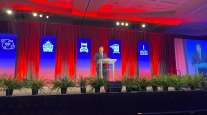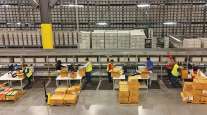Senior Reporter
Economists Warn of Coronavirus Impact on Business

[Stay on top of transportation news: Get TTNews in your inbox.]
Economists are warning that the sudden halt of business activity in the United States caused by the COVID-19 virus will take a serious toll on the economy in the months ahead, and may send the country into a recession.
American Trucking Associations Chief Economist Bob Costello told Transport Topics on March 19 that the U.S. economy could shrink between 5% and 10% in the second quarter, but noted that it’s difficult to pin down exact numbers since economic conditions and the spread of the virus are evolving so rapidly.
“It’s hard to say one thing — there is so much going on,” he said. “As of where we stand today, I expect a little bit of growth in the first quarter, but I would not be surprised if GDP growth fell in the magnitude of 5-to-10% in the second quarter,” he said. “The last time that happened was in the first quarter of 2008, when it fell 8.4%. Those are annualized numbers.”

Costello
Costello said right now the trucking industry is being viewed as a first responder, providing critical supplies to hospitals, clinics and keeping grocery stores supplied with food and other items. That, he said, is boosting trucking activity, especially for those trucking firms and drivers moving those items.
“I think there are some priorities in food, cleaning supplies and so forth, that’s at the top of the list,” he said.
He cautioned, however, that this sudden rise in demand will likely trail off.
“Even if you’re going gangbusters right now from all of this, we should anticipate a slowdown,” Costello said. “We have this peak surge. It’s almost like the hurricane is 100 miles off the shore and in a very short period of time the hurricane is going to hit and then, demand is going to dry up. I think it’s similar to that. Once that’s over, it’s over.”
“In the next several weeks, it’s going to be a very busy time for trucking,” FTR Transportation Intelligence Vice President Avery Vise told TT last week. “The market was already tightening, the spot market was tightening, and we’re going to put a lot of stress on trucking in the next two or three weeks.”
THE CRISIS IN PHOTOS: Impact of the spread of the coronavirus
Still, FTR is projecting that the economy is headed toward a recession; the company is forecasting that the economy will contract by 0.7% in the second quarter and by 1.2% in the third.
A recession is typically defined as two consecutive quarters of negative gross domestic product growth.
“It’s not looking like a good couple of quarters here,” Vise said. “There will be a recession. It will be very painful for two quarters, but then we’re back in a growth environment. It’s not the kind of decline we saw in the Great Recession, and it is also not [that] kind of duration — certainly not as long.”

Vise
Vise said that if companies can resume limited business this spring and damage to the economy does not last into the fall, this could be what’s called a V recession, which is a steep drop in GDP, followed by a rapid recovery. If that’s the case, the third quarter could see a sharp rebound and 3.5% growth in Gross Domestic Product as consumers and businesses begin to spend because of the pent-up demand for goods and services that typically happens during a recession.
“We’re looking at this not even beginning to recover until late May, assuming we do contain the virus. If we do not contain the virus, these numbers are probably on the optimistic side,” he said.
Reached on March 19, Vise told TT that FTR is not revising its economic projections yet, but his team is looking at the numbers on a regular basis. “We haven’t revised the numbers yet. But we are looking at the data,” he said. “It’s clear there will be a recession, the question is whether it’s a serious recession or a catastrophic recession. There’s a lot of data and the mood is very serious. But it could be worse than what we first forecast.”
Looking forward at the state of the economy in 4-5 months, Costello said he’s not making any predictions because the situation is just too fluid. “It’s too far down the road, we just don’t know anything,” he stated. “But if you look at China, they’re starting to come back. They’re far from where they were. Things are picking up slowly there. But they took draconian steps in many parts of China to make sure it didn’t spread any further. We don’t have the testing. Hopefully we get a V shaped recovery, but we just don’t know yet.”
“The damage to the financial side, if this lasts until summer, will be too much to give you a rebound from pent-up demand,” cautioned Rajeev Dhawan, director of the Economic Forecasting Center at Georgia State University. “The way the Federal Reserve cut interest rates [March 15] tells you the financial problems are already here.” The Fed cut interest rates to zero and announced it would buy at least $700 billion in government and mortgage-related bonds as part of a wide-ranging emergency action to protect the economy.
As for job losses, Costello expressed concern. “We’re going to have unemployment shoot up,” he said. “Today they announced last week’s initial unemployment claims, they shot up 70,000 — the highest level in years — and I think there’s more to come this week. I think it will be a higher number. Last week a lot of restaurants were still open. A lot of places were still open. Now this week, they’re shuttering. The auto plants closing down. Unemployment is going to shoot up.”
Costello noted that while Congress is moving rapidly to attempt to mitigate the crisis with a massive stimulus package, he is curious to how the money will ultimately be used.
“We are in uncharted territory,” he said. “This is an invisible enemy.”
Want more news? Listen to today's daily briefing:




